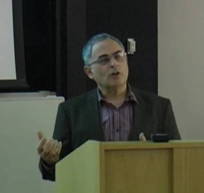
Good evening, and Assalamu alaykum. I'd like to thank Saleem Kidwai for his very kind introduction, as well as for chairing this meeting. We are very appreciative of Saleem and the Muslim Council of Wales for their support, as for the other organisations involved with tonight's event, including the Economic and Social Research Council who funded the whole research project, Cardiff University's School of History, Archaeology and Religion, the Centre for the Study of Islam in the UK, Muslim Youth Wales and the Cardiff University Islamic Society.
As you have already heard, our project is called The Challenge of Islam: Young Bangladeshis, Marriage and the Family in Bangladesh and the UK, and it's a study of how young Bangladeshi Muslims in Bangladesh and the UK think about marriage and the family. We were particularly interested in this study in young people who were involved in what for the moment we'll call contemporary Islamic movements, or modernist forms of Islam. I'll say a little more about that as I go along.
My job today is to give a brief overall introduction to the project, and this will be followed by Santi presenting some of the findings, and some comments from Sophie Gilliat-Ray. There will also be comments by two visiting speakers, Ajmal Masroor and Sheikh Faizul Aqtab Siddiqi, and a discussion session chaired by Mohammed Mansur Ali. There's also a 33-page report which you can download in English or Bangla. It gives you considerably more detail than today's presentation. It's by no means a final report, because although this is the end of the three years of project funding, we've got lots of material and we're clearly going to be working with it and doing things with it for a long time to come. There are a number of articles and two special journal issues in progress and I hope there is going to be a book within a couple of years. So while the funded section of the project is over, we are by no means at the end of work on the project.
To start with, though, I'll say a little more about the idea behind the project. We felt that a lot of the work that had been done academically on new Islamic movements tended to focus either on politics, terrorism, crisis, whatever, or on negative gender issues, veiling and whatever. We felt that, OK, these are significant issues, they need researching, but in some ways perhaps they are not at the centre of why young people might be attracted to Islam today, and to new forms of Islam today. We felt that it made more sense to focus on everyday life, on relationships, marriage and the family if you wanted to understand the appeal of Islam to young people in a country like the UK, and for that matter in Bangladesh too, where there has also been a move towards greater levels of Islamic observance.
And so, this is really the key issue around which the project was centred. Our aim was to try to understand what Islam meant, particularly in its contemporary interpretations, in the lives of young people who are starting [out on marriage and on having a family. We decided to look at young people in Bangladesh and at young Bangladeshis in the UK mainly because we already had considerable experience, Santi Rozario in particular, who is the overall director of the project, has had considerable experience working in Bangladesh, and with the Bangladeshi community in the UK, and our approach is very much an anthropological one, I'll say a little bit more about that as we go along.
The project team consists of three researchers. Apart from Santi, there is myself and a part-time research fellow, Bulbul Ashraf Siddiqi, who is also carrying out a PhD at Cardiff on a related topic under our supervision. There is also a part-time administrative officer, Alvina Gillani. We are all members of the Body, Health and Religion Research Group (BAHAR) based at Cardiff University, and this is one of several different projects in which the group is involved. Sophie Gilliat-Ray of the University's Centre for the Study of Islam in the UK has also been connected with the project in an advisory role.